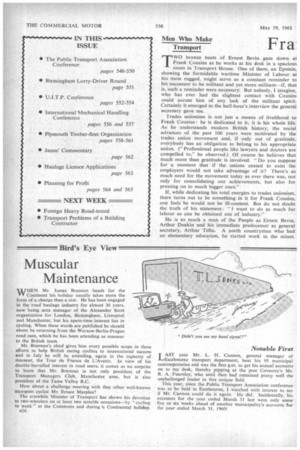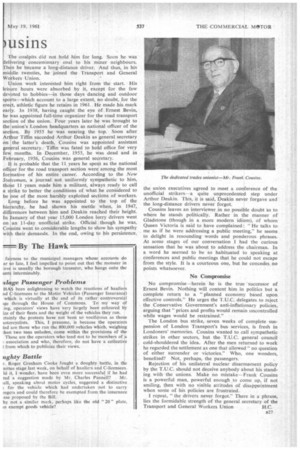Men Who Make Transport.
Page 32

Page 33

If you've noticed an error in this article please click here to report it so we can fix it.
Fra sins
TWO bronze busts of Ernest Bevin gaze down at Frank Cousins as he works at his desk in a spacious room in Transport House. One of them, an Epstein, showing the formidable wartime Minister of Labour at his most rugged, might serve as a constant reminder to his successor to be militant and yet more militant—if, that is, such a reminder were necessary. But nobody, I imagine, who has ever had the slightest contact with Cousins could accuse him of any lack of the militant spirit. Certainly it emerged in the half-hour's interview the general secretary gave me.
Trades unionism is not just a means of livelihood to Frank Cousins: he is dedicated to it; it is his whole life. As he understands modern British history, the social advances of the past 100 years were motivated by the trades union movement and, if only out of gratitude, everybody has an obligation to belong to his appropriate union. ("Professional people like lawyers and doctors are compelled to," he observed.) Of course he believes that much more than gratitude is involved. "Do you suppose for a moment that if the unions ceased to exist the employers would not take advantage of it? There's as much need for the movement today as ever there was, not only for consolidating our achievements, but also for pressing on to much bigger ones."
If, while dedicating his total energies to trades unionism, there turns out to be something in it for Frank Cousins, one feels he would not be ill-content. But do not doubt the truth of his statement: " 1 want to do as much for labour as can be obtained out of industry."
He is as much a man of the People as Ernest Bevin, Arthur Deakin and his immediate predecessor as general secretary, Arthur Tiffin. A north countryman who had an elementary education, he started work in the mines. he coalpits did not hold him for long. Soon he was vering concessionary coal to his miner neighbours. h n he became a long-distance driver. And thus, in his mi dle twenties, he joined the Transport and General Wi kers Union, nion work interested him right from the start. His leis re hours were absorbed by it, except for the few de ted to hobbies—in those days dancing and outdoor spo s—which account to a large extent, no doubt, for the ere t, athletic figure he retains in 1961. He made his mark ear y. In 1938, having caught the eye of Ernest Bevin, he as appointed full-time organizer for the road transport sec ion of the union. Four years later he was brought to the union's London headquarters as national officer of the sec ion. By 1955 he was nearing the top. Soon after Ar u ur Tiffin succeded Arthur Deakin as general secretary on the latter's death, Cousins was appointed assistant ge eral secretary. Tiffin was fated to hold office for very fe months. In December, 1955, he was dead and in Fe ruary, 1956, Cousins was general secretary.
1 is probable that the 11 years he spent as the national offi er for the road transport section were among the most for ative of his entire career. According to the New Sin esman, a journal not uniformly sympathetic to him, tho e 11 years made him a militant, always ready to call a s ike to better the conditions of what he considered to be s ne of the most harshly exploited sections of workers.
ong before he was appointed to the top of the hie archy, he had shown his mettle when, in 1947, diflcrences between him and Deakin reached their height. In anuary of that year 15,000 London lorry drivers went on an 11-day unofficial strike. Official though he was, Co sins went to considerable lengths to show his sympathy witrt their demands. In the end, owing to his persistence, the union executives agreed to meet a conference of the unofficial strikers--a quite unprecedented step under Arthur Deakin. This, it is said, Deakin never forgave and the long-distance drivers never forgot.
Cousins leaves an interviewer in no possible doubt as to where he stands politically. Rather in the manner of Gladstone (though in a more modern idiom), of whom Queen Victoria is said to have complained : "He talks to me as if he were addressing a public meeting," he seems to delight in resounding words and ponderous phrases. At some stages of our conversation I had the curious sensation that he was about to address the chairman. In a word he seemed to be so habituated to speaking at conferences and public meetings that he could not escape from the style. It is a courteous one, but he concedes no points whatsoever.
No Compromise
No compromise—herein he is the true "successor of Ernest Bevin. Nothing will content him in politics but a complete return to a "planned economy based upon effective controls." He urges the T.U.C. delegates to reject the Conservative Government's anti-inflationary policies, arguing that "prices and profits would remain uncontrolled while wages would be restrained."
The London bus strike, seven weeks of complete suspension of London Transport's bus services, is fresh in Londoners' memories. Cousins wanted to call sympathetic strikes in other sectors, but the T.U.C. general council cold-shouldered the idea. After the men returned to work he regarded the settlement as one that allowed " no question of either surrender or victories." Who, one wonders, benefited? Not, perhaps, the passengers.
Rejection of his unilateral nuclear disarmament policy by the T.U.C. should not deceive anybody about his standing with the unions. Make no mistake—Frank Cousins is a powerful man, powerful enough to come up, if not smiling, then with no visible attitudes of disappointment when some of his policies are frustrated.
I repeal, " the drivers never forgot." There in a phrase, lies the formidable strength of the general secretary of the Transport and General Workers Union H.C.




























































































































